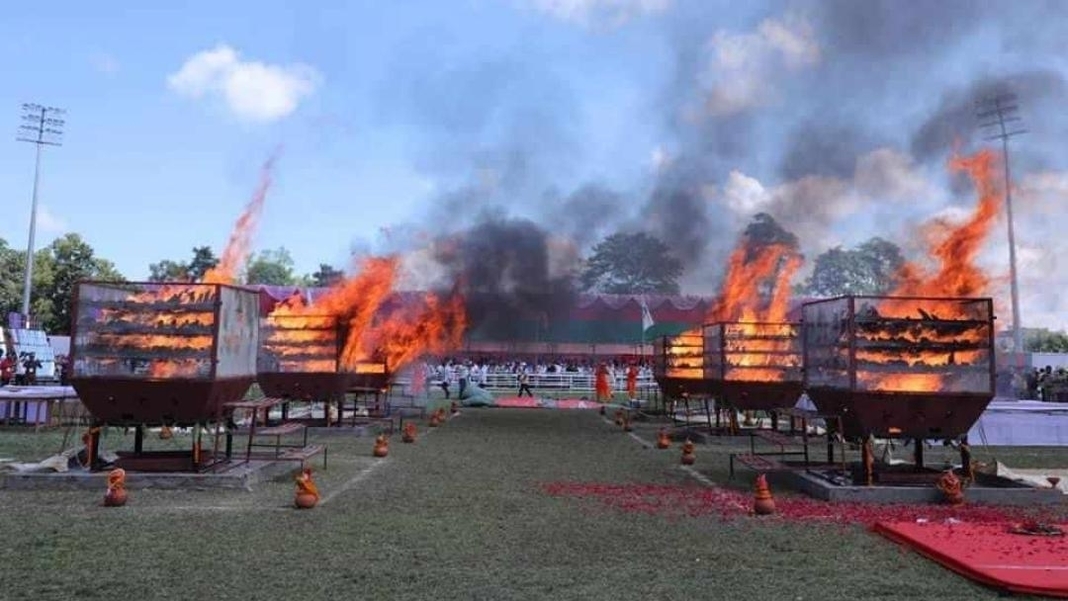Guwahati, Sept 22: To mark World Rhino Day, Assam burnt over 2,400 Rhino horns stored in its treasuries, the largest such drive in entire Asia, on Wednesday by following vedic rituals in a public ceremony at Bokakhat in Golaghat district of Upper Assam.
A total of 2,623 horns belonging to Assam’s state animal, one-horned-rhinos, were found in treasuries across the state that had been curated over years either extracted from rhinos that died of natural causes and accidents or seized from poachers.
Before the ceremony, Assam Forest Minister said 2,479 horns will be burnt while 94 horns with unique specifications will be preserved for research purposes and 50 have been kept as there are Court cases involving those. Assam Chief Minister Himanta Biswa Sarma said that the drive will send a strong message to the world that Assam only values the horn on a live rhino.
Assam Chief Minister Himanta Biswa Sarma said that the drive will send a strong message to the world that Assam only values the horn on a live rhino.
“If we continue to keep the horns in our treasuries, it sends a wrong message that we are protecting something valuable. By burning those, we want to let people know that a rhino horn is only valuable to us when its enshrined atop a live rhino’s head. If the rhino is dead, the horn itself is valueless to us,” Sarma said during the Wednesday event in which he was the chief guest.

Horns set ablaze after vedic rituals
The horns were kept in six temporary furnaces which were set on fire after Hindu priests read last rights and Sarma too paid his “last respects”.
“In every religion, it is important that we pay our last respects so that the soul can transcend to after life. We have to de-horn and bury the rhino that die of natural causes and accidents, or else poachers would dig up their graves and steal the horn away. Today (Wednesday), we are paying our last respect to the remaining part of the rhinos so that their souls too can transcend to the afterlife,” Sarma said in his speech.
The horns had undergone through an elaborate process of verification and sampling during which, the horns were cleaned, each provided a bar code, Unique Identification Number and samples were drilled out for studying the genetic patterns, chemical composition and DNA patterns to study the genetic regression and migrating patterns of the animal.
Kaziranga Museum for preserved horns
The 94 horns, mostly those above 1.5kg, that are being preserved, also includes the worlds second longest horn — 51.5 cm long, weighing 2.5 kg found in Guwahati treasury where it was kept since 1961. Also preserved is the world’s heaviest rhino horn weighing 3.05kg and 36 cm long found in Bagori Range of Kaziranga in 1982 and lodged at Bokakhat treasury since then.
“Assam government will build a dedicated Kaziranga Museum for animals that will be adorned with these horns and texidermised One horn rhinos and other animals will be kept for people to closely view them,” Sarma informed.
Practice of burning animal parts
The Delhi Zoo in national capital had periodically in 2014 and 2017 burnt animal body parts seized from poachers, but not in the scale in which Assam did. In Asia, Chitean National Park in Nepal, back in 2017, burnt a stockpile of over 4,000 animal body parts, but those were accumulation of several animal’s hide, horn, bones and tusks.
In African countries also this exercise is done regularly and at a very large scale — the highest being 105 tonnes of ivory and over a tonne of Rhino horn in 2016.
Demand for legalizing horn trade
Many rhino farmers in Africa have suggested that the horn trade be legalised and regulated so that the countries can earn revenue by selling those to countries like China and Vietnam where there is a traditional market for these materials for their belief of rhino horns possessing medicinal values to cure ailments like hair loss, cancer, erectile dysfunction etc.
Sarma on Wednesday said, “I too have been suggested why not sell the horns which will help government build roads and schools. But, this goes against our culture and Constitution. Moreover, this will also encourage the poachers and will send a message that Assam too subscribe to the superstition that rhino horns may have medicinal values.”
Rhino horns are composed entirely of keratin, a protein found in fingernails and hair, which has been refuted by several researchers to have any medicinal values.
Assam committed to protecting its one-horned rhinos
Reaffirming that Assam is committed in protecting its one-horned rhinos, Sarma said, “The message delivered through reinforced security went very loud and clear to the poachers that the Assam in current regime will not spare them. So, the issue of rhinos being poached is out of question. To protect the rhinos from getting into accidents while crossing roads or rail lines, we are planning to create elevated corridor which will also be realised shortly.”



